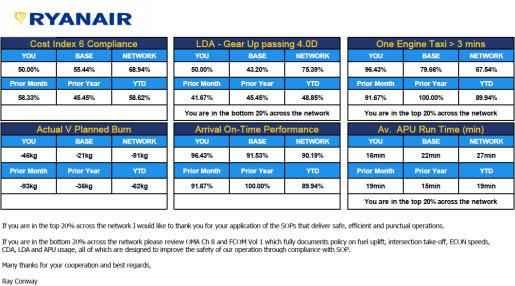

Did you believe that Ryanair will go through a metamorphosis – improving customer experience & employee relations, as promised in the “Always Getting Better” Ryanair campaign? If you did, it’s time to pour cold water on your head – at least when it comes to employee relations. The airline just took a step in the opposite direction: putting more pressure on pilots to save money. How? By saving fuel – at all costs.
As of last month, Ryanair is ranking its pilots’ personal operational performance, based on 6 ‘Key Performance Indicators’ (KPIs): 1) Cost Index 6 Compliance, 2) LDA – Gear Up passing 4.0D, 3) One Engine Taxi > 3 mins, 4) Actual V Planned Burn, 5) Arrival On-Time Performance, 6) Average APU Run Time (min). For the ones not familiar with these terms, most of these KPIs have actually little to do with flight safety. Instead, they are about saving fuel & making money.
The first key indicator – Cost Index 6 Compliance – for example, means compliance with the recommendations of a tool built into the Flight Management Systems to reduce fuel burn and therefore costs. Similarly, the indicator on running time of the Auxiliary Power Unit (APU) relates to fuel burn. The APU is mainly used for air conditioning & engine start. The longer it runs, the more fuel it burns.
All this might seem innocent, at first glance: what’s wrong with saving fuel or arriving on time (see 5th indicator)? Nothing. Nothing wrong, except for the fact that such a ranking risks creating an unhealthy incentive for pilots to make decisions based on cost implications for the company and – crucially – to prioritise cost-considerations over safety aspects.

In fact, Ryanair pilots will not only receive these individual monthly “performance” statistics but they will also be ranked whether they are on the top, bottom or middle of the chart. A pilot at the bottom or lower-middle part of the chart may feel compelled to improve his/her “performance”. Or might be gently encouraged to do so by others. In both cases, the drive to reduce fuel burn and save costs risks ending up to have the upper hand in decision-making. Ironically, even if all pilots improve significantly their individual and collective fuel-burn-performance, there will always be the bottom part performers and always pressure to burn even less fuel... Every operational decision a pilot takes, will be bent through this prism.s just another example what matters most to this airline: money.
This adds up to an already rather special company culture and employment set-up, where many are shown to feel uncomfortable to report safety concerns. And where many crews are not directly employed, but instead through temporary work agencies and/or as so-called ‘self-employed’ pilots – some of whom are now under investigation for potential tax and social security fraud [See more].
Against this background, Ryanair pilots hardly need any additional “incentives” to improve their fuel-burn performance and to get their passengers to destination even faster.
This is not the first time Ryanair is put into the spotlight. So far the airline used ‘fuel league tables’ to rank its pilots on the basis of their fuel consumption. The tables made headlines years ago when three Ryanair aircraft called ‘Mayday’ for being low on fuel, at the same place & at the same time. The league tables were then criticized by experts and even questioned by European Parliamentarians.
The data used by Ryanair to feed this fuel ranking is obtained for safety purposes and should be used for safety purposes only. The pilot community has historically agreed with collection of such data in the interest of aviation safety. Data helps aviation experts understand events, find out new trends, counter threats and emerging risks. Data is a key component for a Just & Safety culture in aviation.
This ranking, however, is not about safety – despite Ryanair’s claim that such data “enhances safety standards across our expanding base network”. In fact, there are many reasons to believe this ranking might end up doing just the opposite: it risks giving an unwelcome incentive for pilots to take operational decisions driven by commercial pressure; inciting apprehension of being penalised for any 'fuel-intensive' flight safety decisions they take; and – as a result – challenging the company’s overall safety culture.
No matter how you try to turn this, the latest from Ryanair is no metamorphosis. It is just another example what matters most to this airline: money.